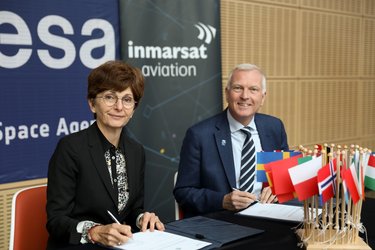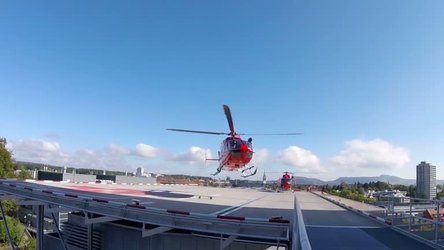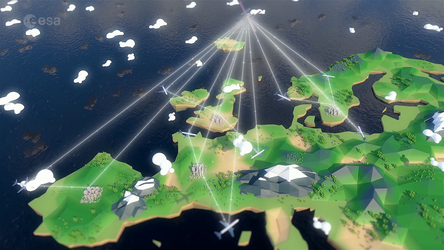Accept all cookies Accept only essential cookies See our Cookie Notice

About ESA
The European Space Agency (ESA) is Europe’s gateway to space. Its mission is to shape the development of Europe’s space capability and ensure that investment in space continues to deliver benefits to the citizens of Europe and the world.
Highlights
ESA - United space in Europe
This is ESA ESA facts Member States & Cooperating States Funding Director General Top management For Member State Delegations European vision European Space Policy ESA & EU Space Councils Responsibility & Sustainability Annual Report Calendar of meetings Corporate newsEstablishments & sites
ESA Headquarters ESA ESTEC ESA ESOC ESA ESRIN ESA EAC ESA ESAC Europe's Spaceport ESA ESEC ESA ECSAT Brussels Office Washington OfficeWorking with ESA
Business with ESA ESA Commercialisation Gateway Law at ESA Careers Cyber resilience at ESA IT at ESA Newsroom Partnerships Merchandising Licence Education Open Space Innovation Platform Integrity and Reporting Administrative Tribunal Health and SafetyMore about ESA
History ESA Historical Archives Exhibitions Publications Art & Culture ESA Merchandise Kids Diversity ESA Brand Centre ESA ChampionsLatest
Space in Member States
Find out more about space activities in our 23 Member States, and understand how ESA works together with their national agencies, institutions and organisations.
Science & Exploration
Exploring our Solar System and unlocking the secrets of the Universe
Go to topicAstronauts
Missions
Juice Euclid Webb Solar Orbiter BepiColombo Gaia ExoMars Cheops Exoplanet missions More missionsActivities
International Space Station Orion service module Gateway Concordia Caves & Pangaea BenefitsLatest
Space Safety
Protecting life and infrastructure on Earth and in orbit
Go to topicAsteroids
Asteroids and Planetary Defence Asteroid danger explained Flyeye telescope: asteroid detection Hera mission: asteroid deflection Near-Earth Object Coordination CentreSpace junk
About space debris Space debris by the numbers Space Environment Report In space refuelling, refurbishing and removingSafety from space
Clean Space ecodesign Zero Debris Technologies Space for Earth Supporting Sustainable DevelopmentApplications
Using space to benefit citizens and meet future challenges on Earth
Go to topicObserving the Earth
Observing the Earth Future EO Copernicus Meteorology Space for our climate Satellite missionsCommercialisation
ESA Commercialisation Gateway Open Space Innovation Platform Business Incubation ESA Space SolutionsLatest
Enabling & Support
Making space accessible and developing the technologies for the future
Go to topicBuilding missions
Space Engineering and Technology Test centre Laboratories Concurrent Design Facility Preparing for the future Shaping the Future Discovery and Preparation Advanced Concepts TeamSpace transportation
Space Transportation Ariane Vega Space Rider Future space transportation Boost! Europe's Spaceport Launches from Europe's Spaceport from 2012Latest

Representatives of Inmarsat, ESSP and ESA
Thank you for liking
You have already liked this page, you can only like it once!
An agreement signed today between satellite company Inmarsat and the European Satellite Services Provider, which represents air traffic controllers from seven European countries, will enable final tests of the space-based system to be conducted and evaluated. It is expected to be introduced across Europe by 2023.
ESA has worked with Inmarsat to develop a space-enabled digital alternative to traditional air traffic control that enables pilots to take more efficient trajectories, saving fuel and cutting carbon emissions.
The system – called Iris – uses satellites to exchange data with aircraft, supplementing the terrestrial communications system with digital position reports, clearances and runway conditions, sent via telecommunications satellites between cockpits and air traffic control centres.
Flight plans can be continually updated during the flight to maintain an optimal trajectory towards the destination, minimising the fuel burned and the carbon dioxide emitted.
Iris was first tested on planes flying over Europe in 2018 and debuted in the US on a new Boeing 737-9 operated by Alaska Airlines earlier this year.
Today’s agreement is between Inmarsat and the European Satellite Services Provider, a company founded by seven air navigation service providers from France, Germany, Italy, Portugal, Spain, Switzerland and the UK to operate and provide services for a satellite-based navigation system managed by the European Commission called the European Geostationary Navigation Overlay Service.
It aims to manage final testing and certification – which includes certification from the European Aviation Safety Agency ahead of commercial rollout across Europe. The agreement was signed today at the World Air Traffic Management Congress in Madrid.
Iris will implement its improvements under the European Commission’s single European sky air traffic management research programme, which promises to boost efficiency, capacity and performance of air traffic management worldwide.
-
CREDIT
Inmarsat -
LICENCE
ESA Standard Licence

ESA and Inmarsat sign agreement to use satellites fo…

Iris flight trial

Iris terminal

Iris flight trials for safer air traffic















 Germany
Germany
 Austria
Austria
 Belgium
Belgium
 Denmark
Denmark
 Spain
Spain
 Estonia
Estonia
 Finland
Finland
 France
France
 Greece
Greece
 Hungary
Hungary
 Ireland
Ireland
 Italy
Italy
 Luxembourg
Luxembourg
 Norway
Norway
 The Netherlands
The Netherlands
 Poland
Poland
 Portugal
Portugal
 Czechia
Czechia
 Romania
Romania
 United Kingdom
United Kingdom
 Slovenia
Slovenia
 Sweden
Sweden
 Switzerland
Switzerland

























